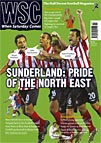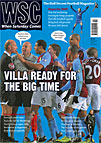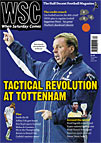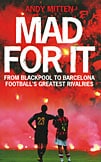 Dear WSC
Dear WSC
Bruce Wilkinson (WSC 267) pointed out that ticket queues “seem a quaint ritual of a bygone age”. Waiting in a virtual internet queue bears no similarity to lining up outside the box office. I have my tickets for the FA Cup final, but I do not feel as if I earned them. Instead of getting up in the middle of the night, crossing London, losing half a day’s work, standing in the rain shuffling forward inch by inch while nervous that there are too many punters and too few tickets, I merely sat in my dressing-gown in front the PC. There is no one to talk to in the “virtual waiting room”. Your opportunity is allotted randomly. Suddenly it’s all over and you have what you came for. One should be happier as the process is simple and efficient and the desired result achieved, but somehow it feels like a hollow victory as it lacks the sense of accomplishment joy and triumph of the old-fashioned process. You can’t even wave the tickets in triumph above your head as they are sent by post.Obviously my complaining about the changes that actually improve my life marks me down as “old”. I am not asking to bring back rickets and polio and to repeal the Factory Acts but I do miss a modicum of discomfort and inconvenience. The old experience was akin to standing on the terraces or being subject to the over-zealous policing that used to mark us out as a tribe. Under the new regime the tickets are yours if your broadband speed is faster and your credit card more golden than the next, rather than if you have more commitment stamina and perseverance.Will the ultimate progress be when we treat football like theatre and opera by dressing-up smartly for the occasion and ordering our interval drinks? Or is that Club Wembley?
Patrick Sheehy, London
Search: 'Faroe Islands'
Stories
 Carlos Queiroz's move home from Manchester United has not gone well. Phil Town reports on a national team suddenly in crisis
Carlos Queiroz's move home from Manchester United has not gone well. Phil Town reports on a national team suddenly in crisis
Despite a series of nearly-got-theres during five years as Portugal coach, by the summer of 2008 Luiz Felipe Scolari had overstayed his welcome and wanted out to lusher pastures. Perhaps seduced by his two successive World Cup wins at Under-20 level (1989 and ’91) and by his association with Manchester United’s successes in recent years, but apparently ignoring his indifferent previous spell as national coach (ten wins from 23 games between 1991 and ’93), the Portuguese Football Federation (FPF) put their faith in the Mozambique-born Carlos Queiroz, at the time a popular choice.
 Their 1990 victory over Austria traumatised the opposition and the Faroese have been reopening old wounds, reports Paul Joyce
Their 1990 victory over Austria traumatised the opposition and the Faroese have been reopening old wounds, reports Paul Joyce
The Faroes’ first competitive international, on September 12, 1990, has passed into football folklore. As none of the 18 islands that comprise the North Atlantic archipelago had a suitable grass pitch, their opening Euro 92 qualifier took place in Landskrona, Sweden. Their opponents, an Austria side that had just played at Italia 90, were so dismissive of the Faroese amateurs that striker Toni Polster predicted a 10‑0 landslide. The Austrians even cancelled their final training and went to watch Denmark play Wales in Copenhagen.
What are the expectations for the team?
Expectations are pretty low with Austria for the first time not being listed in the top 100 of the FIFA rankings, below such teams as New Zealand and The Gambia. But the last game against the Netherlands has brought back some hope – Austria took a three-goal lead in the first half, although they did lose 4-3. Of course, when the Euro 2008 euphoria starts all the bad results of recent years will be forgotten. But with opponents such as Germany and Croatia euphoria may not be enough.
Are there any players who have appeared in TV commercials or other advertising?
Our captain Andreas Ivanschitz has been busy flogging LG television sets and the whole team like to eat at McDonald’s, which may offer a clue to their recent performances.
Is the coach popular?
Not that I know of. But Josef Hickersberger has proven that he can absorb a lot of criticism without needing counselling and has therefore has earned some respect among the fans and journalists. Hickersberger was also Teamchef for Austria’s worst ever result, the 1-0 defeat against the Faroe Islands in 1990. He knows that only a successful European Championship – that is, getting to the knockout stages – can help the nation to forget this embarrassment.
Which players are good interviewees and who are the worst?
Striker Roland Linz can be a difficult character but at least he shows a sense of humour. Goalkeeper Alex Manninger can also be entertaining, albeit unintentionally due to the hyper way he tends to behave in post-match interviews.
Are then any players with unusual hobbies or business interests?
In general the team is very young and the unspectacular hobbies range from snowboarding to going to cinema and eating popcorn. Defender Johnny Ertl plays guitar in a Rock band called Ohne Lizenz, which could be translated as “Without concession”, and goalkeeper Jürgen Macho – now with AEK Athens – used to be a member of the diehard supporters’ group Rapid Ultras in his early days in Vienna.
Do any of the players have famous girlfriends or wives?
Roland Linz used to be involved with an international swimmer, Fabienne Nadarajah – but that is a thing of the past. Why should famous women want to be connected with unknown footballers?
Will there be any rehearsed goal celebrations?
Last year Austria scored only seven times in 12 matches. There are no discussions about how best to celebrate goals.
Will any former players be involved in media coverage?
Players from the World Cups of 1978 and 1998 such as Hans Krankl and Toni Polster are doomed to spend the rest of their lives ranting about how they would take the national team to new heights if only someone would let them. But Krankl has already had his chance. One exception is Krankl’s contemporary, Herbert Prohaska, an Austria Vienna legend who also played in Italy. He analyses matches for the national channel ORF and – despite or even because of some linguistic problems – has somehow managed to become a national treasure.
Do Austrian fans have any favourite chants or songs?
Yes, but they are rather boring. Immer wieder Oesterreich (Forever Austria) is probably the best known. Try the league for much better chants.
Stefan Kraft
 From Blackpool To Barcelona; Football’s Greatest Rivalries
From Blackpool To Barcelona; Football’s Greatest Rivalries
by Andy Mitten
HarperSport, £15.99
Reviewed by Mark O'Brien
From WSC 264 February 2009
One of the oldest questions asked in football is: “Which is the biggest derby game?” Like trying to argue who is the biggest club or who has the best supporters, it’s actually something of a pointless exercise, but nevertheless these fierce local rivalries retain a unique fascination, and even if sides have been slugging it out forever – and at least four times a season for the Old Firm – the sense of anticipation before each encounter rarely dissipates.